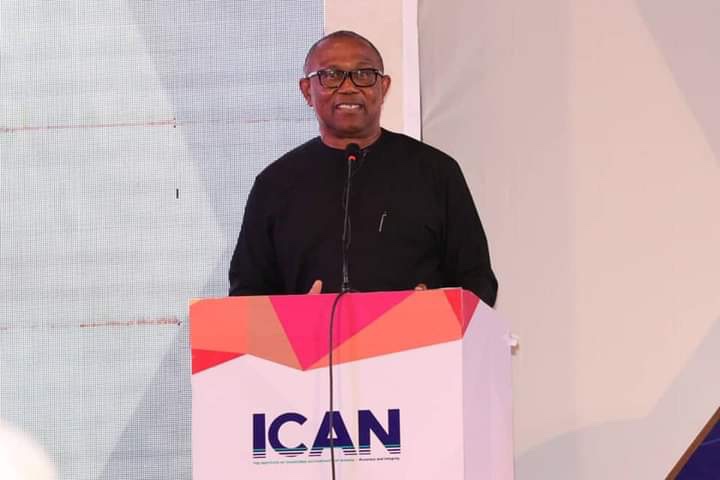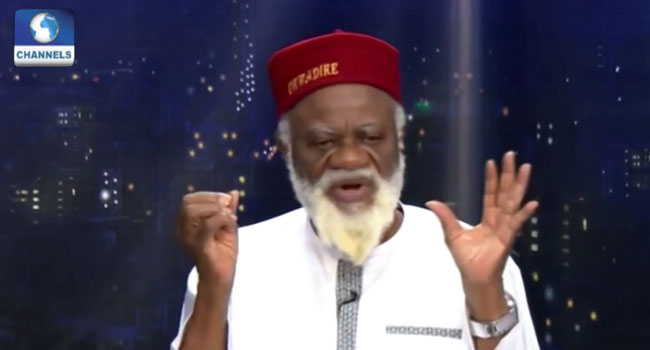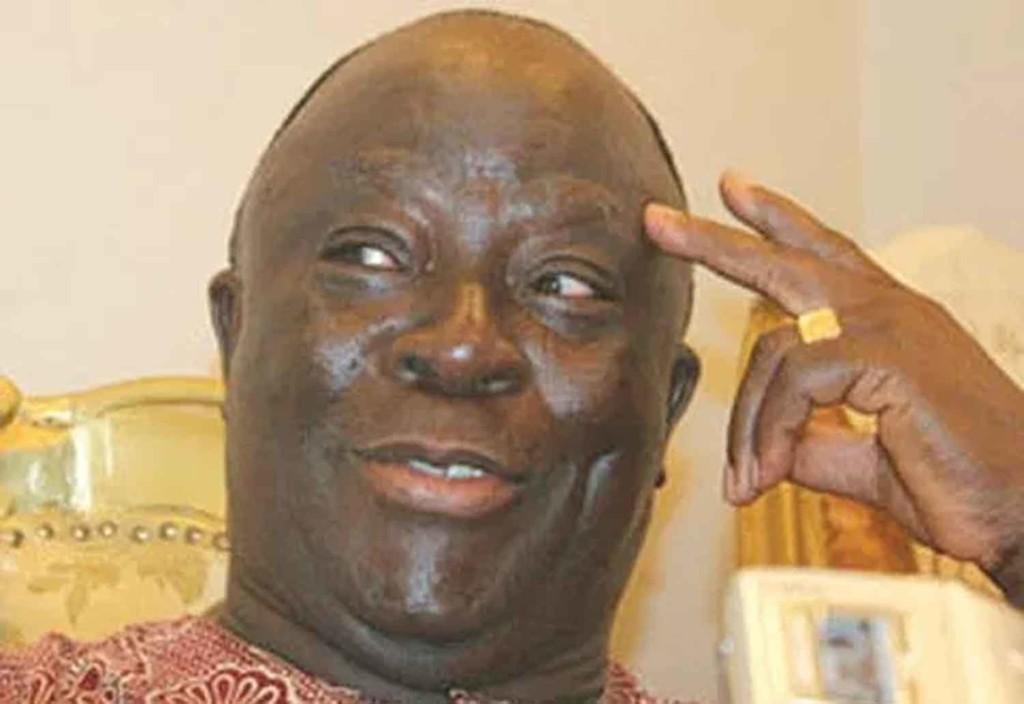Address by H.E. Mr. Peter Obi, Presidential Candidate of the Labour Party,
To 52nd Annual Accountants (ICAN) Conference
At the International Conference Centre Abuja FCT,
Wednesday 12th October, 2022.
Protocols
- I thank the Organizers of the 52nd Annual Accountants (ICAN) Conference, and especially the 58th ICAN President, Mallam Tijani Musa for the kind invitation extended to me.
- I join you today, not because I am an Accountant, but because we are all fellow believers in the search for a new Nigeria. Also, ICAN as a body of accountants continues to contribute to economic sustainability to the country. Today, I will speak briefly on “Accounting As A Requisite For Sustainable Governance.”
- I have had a good number of speaking engagements since, in concordance with the people; I decided to offer myself for election for the office of President of Nigeria, in conjunction with Dr. Yusuf Baba-Ahmed, under our great party, The Labour Party of Nigeria. Yet this particular invitation to share my perspectives with you is of special importance to me.
- Whether you are involved in corporate, public, government or forensic accounting, all accountants are fundamentally concerned with financial records.
- And since finance is the primary resource in any type of development, incompetence in financial records, totally distorts intended development.
- Accounting is not only important to development; it is in fact a requisite in ensuring sustainable governance and a stabilising factor in development. Proper accounting serves as checks on the activities of the three arms of government as well as the three tiers of government.
- Deprivation and poverty pose a great challenge to Nigeria. It is on record that more than half of Nigeria’s population is living under poverty. A greater percentage of the challenges we face in Nigeria are of economic nature. Tackling the economic challenges of the nation will help resolve some of its nagging problems.
- It is logical; therefore, that placing Nigeria on the part of economic prosperity will help reduce our national challenges to the barest minimum. We must therefore put in place, sustainable economic policies that will drive economic prosperity in the country.
- The main engine of economic growth, as I have continued to argue, is Micro, Small, and Medium Business Sector. A robust MSME sector will boost production of goods and services, increase jobs creation and reduce poverty. It will also serve as a tool of combating, not just poverty, but social vices like crime, drug abuse and so on.
- Putting in place fiscal and monetary policies that will encourage the MSME sector will help catalyse sustainable economic growth that will place the country on the path of economic prosperity.
- In keeping with our vision of moving the country from consumption to production, we must pursue sustainable economic policies that will help the nation to remain productive in all fronts and sectors. For this reason we will endevour to domesticate the Sustainable Development Goals (SDGs) as part of our governance modalities.
Amplification of Consumption to Production Mantra
- We have a three-tracked plan aimed at achieving Goal 12 of the SDG, namely ensuring sustainable consumption and production patterns. First, our focus will be on agriculture and production-centered growth for food security and export, with more emphasis on exporting finished products instead of commodities and raw materials. This relates mainly food and textiles. Nigeria has over 84 million hectares of arable land. And barely 40% of our arable land is cultivated today. Nigeria’s arable land is her new oil and gold.
- Second, pursuant to Goal 9 of the SDGs our administration will from its inception, continue to encourage investment in infrastructure – energy, transport, irrigation, and telecoms—to grow these and other sectors. We are eager to quickly close the infrastructure gap between now and 2030.
- We will expand the frontiers of financial inclusion to ensure that SMEs have greater access to credit to grow. We will work with financial institutions to improve their ability to identify credit worthy borrowers; and support inventory financing, which will help to unlock finance for SMEs dealing with high account receivables. We will enforce the legal framework protecting foreign investors and their indigenous partners. This is the only way to tamper monopoly and capital flight.
- Third, as a nation, Nigeria must look beyond oil. We therefore intend to leapfrog Nigeria from oil to the Fourth Industrial Revolution by expanding physical infrastructure through market-driven reforms that will unleash growth-enabling entrepreneurship and market-creating innovations. To ensure sustainability and resilience, we will stop borrowing for consumption. All loans must be invested in regenerative projects. We shall pursue a drastic reduction in cost of governance and corruption; improve ease of doing business to attract Foreign Direct Investment to jumpstart industrialization and when borrowing is unavoidable, it will be strictly for production.
- It is also imperative that henceforth, we should strive to operate within available resources and strive for a balanced national budget as cost saving measures. Whatever oil we still have will be refined domestically. These measures along with ending the leakages including the subsidy regime and improving our tax regime should do the magic of moving Nigeria from consumption to production.
Role of Accounting in Sustainable Governance
- I have touched on cost of governance and blocking leakages. The efficiency and credibility of any system whether an institution or even a government is closely linked to the credibility of its accounting system, and where there is disorganisation in the growth of any nation, you will always find discrepancies in the accounting practices.
- We have spoken so much about how bad things have gone, not because we want to raise fears, but because it is important for one, to properly understand how deep down you have sunk, in order to determine what efforts exactly, you have to put in, to correct existing anomalies.
- Our message of probity, equity , innovation , competence, true brotherhood and visionary reconstruction in governance, has not only been embraced by the youth, but has now become too many, their own personal and collective battle, to take back our country, and rescue it from the difficult times with which we daily struggle.
- So let me briefly present to you how I think my administration and ICAN can partner to begin turning the country around, when I am elected next February, as President of this great nation.
- As President, one of my priorities will rule of law and due diligence, ad promoting intangible assets, which are vital components of holistic security. This will also underpin public sector accountability. We will abide by the Fiscal responsibility laws. All arms of government will be subject to routine audit this is the only way to ascertain the veracity of procurement figures, recurrent and concurrent expenses, even constituency projects.
- In many ways accounting is equivalent to census. Budgetary allocations for staff emoluments in all facets of government should be audited. There should always be some connectivity between, revenue and expenses – and only accountants can guarantee our institutions a clean bill of health in that regard.
- There must be clear orientation. We have weak institutions. Yet, we must not feel that dialogue is a sign of weakness, we must not be quick to show force, when reaching out and talking may make a difference, and we must muster the courage to accept solutions that may not always flow with our personal positions, so much as they are ultimately in the interest of the country.
- Nigeria is not bereft of good governance ideas and plans. However, a combination of institutional weaknesses and lack of political will meant that various policies and strategies are poorly implemented leading to poor outcomes for the people. Hence, the overall goal of my administration shall be to streamline governance, make it more responsive, transformative, and effective. We must draw a clear distinction between good governance and more governance. Those of your in the accounting sphere must not abate cover-ups. A forensic audit must serve its purpose, even if it means indictment of the high and mighty.
- Conventional wisdom instructs that more governance is not necessarily good governance, which ultimately is aimed at continuous delivery of services, encouraging constructive criticisms and public feedback for public policy making.
- We do not have to reinvent the wheel in addressing Nigeria’s failing economy, but we can begin to apply a higher level of research, and greater innovation I creativity, thinking out of the box, in assessing our potentials, and how to widen their enhancement.
The Big Elephant
- My last points could easily have been my first, but I preferred not to lead with them. So mlet me touch on corruption. It is the issue of corruption and investment protection. It is no secret that corruption has been endemic and one of the biggest obstacles to our economic progress in Nigeria. Corruption is the big elephant in the room.
- In the past few days we have seen videos of illegal pipelines connected to national oil pipeline networks, running for kilometers… where billions of dollars that should have been used for development and welfare, have been illegally siphoned away, for up to nine years , according to reports .
- What I first expected was that the hierarchy of our top oil management bureaucracy will immediately resign, because without mincing words, this is irrefutable evidence of their incompetence, if not collaboration. My administration, when we come in, will tackle this corruption head on. We will have zero tolerance for corruption.
Conclusion
- In closing, I have not forgotten that this is a gathering of accountants. As a man with a private background in business and administration, I have always been very aware and sensitive to the position of accountants in our national economy and development.
- And as people of precise and accurate presentation, I am sure you will permit me to speak frankly. The truth is that the position of accountants in our society and in our public institutions is very vital in checking corruption especially in government. But it is also true that the position of accountants in our society is also vital in aiding corruption in our society.
- If you look at the written financial regulations in any establishment, you will see watertight regulations of auditing, vetting, tendering, vouchering, joint signatories and other safeguards, designed to check embezzlement and corruption, yet these sharp practices and misappropriated sums continue to rise, and I understand that there is now a Nigerian record of almost N109 billion allegedly embezzled by an accountant.
- I know your profession an honorable one, so I do not have to emphasise so much why it is important that you increase the level of peer surveillance and internal discipline among your ranks , if we cannot properly account for our finances , the country is finished , let us as accountants, do more to check and stop corruption
- May God bless the Accountancy profession and ICAN; the noble association of men of figures. God bless our dear country, Nigeria.







